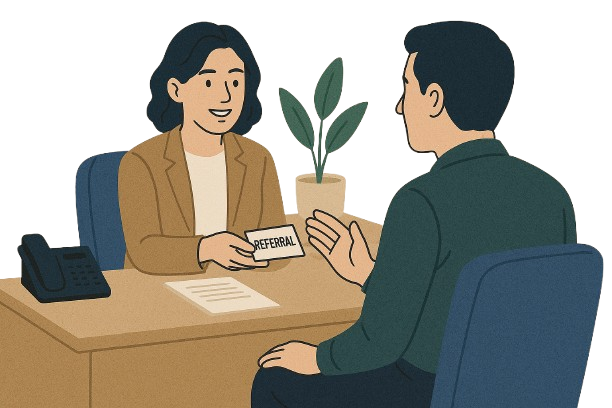Medication Management
Initiating medication for mental health conditions is important because it can provide the chemical balance the brain needs to reduce symptoms, restore daily functioning, and support the healing process.
Why It Matters:
- Relieves Symptoms: Medication can quickly reduce intense symptoms like anxiety, depression, mood swings, or intrusive thoughts, helping individuals feel more in control.
- Supports Therapy: Medication often works best alongside therapy, creating a stronger foundation for emotional growth and recovery.
- Improves Daily Life: With stabilized symptoms, people can sleep better, focus more, build stronger relationships, and return to work or school more effectively.
- Prevents Escalation: Early treatment can stop conditions from worsening or leading to crises such as hospitalization or self-harm.
In short:
Starting medication is often a powerful first step toward regaining balance, hope, and a better quality of life—it’s about giving yourself the support you deserve to heal and move forward.
Individual Therapy
Why It’s Important:
Promotes Emotional Stability
Understanding how to manage emotions like stress, sadness, or anxiety helps prevent mental conditions from worsening and promotes a sense of inner peace and resilience.Improves Daily Functioning
Coping strategies and treatment can help people stay focused, organized, and productive at work, school, or home.Strengthens Relationships
When people learn to manage their mental health, communication, empathy, and connection with others often improve.Reduces Risk of Crisis
Early intervention and self-awareness can prevent serious consequences like mental breakdowns, self-harm, or suicide.Builds Self-Empowerment
Knowing how to cope with mental conditions increases confidence and gives individuals a sense of control over their lives.Encourages Seeking Help
Education reduces stigma, helping people understand that it's okay to ask for help and that support is available.
In Summary:
Learning how to deal with mental conditions is not just about treatment—it's about prevention, empowerment, and growth. It allows individuals to live with greater balance, purpose, and connection, and helps build a healthier, more compassionate society.
Referral
Support the individual in connecting with and utilizing community resources by providing timely and appropriate referrals.
To support the individual in their journey toward recovery and stability, I strongly recommend a referral to local community mental health resources and a crisis care center. These services provide immediate support, ongoing care, and access to programs that address both urgent needs and long-term goals.
Purpose of Referral:
- Crisis Stabilization: Immediate care for emotional or mental health crises in a safe, supportive environment.
- Mental Health Services: Access to therapy and support groups.
- Case Management: Help with housing, employment, education, and financial assistance.
- Life Skills Programs: Support with daily living skills, coping strategies, and community reintegration.
Recommended Resources:
- Local Crisis Care Center – For 24/7 emotional support, assessment, and short-term stabilization.
- Community Mental Health Center – For long-term therapeutic services and care coordination.
- Peer Support Programs – Connects individuals with lived experience who can offer guidance and encouragement.
- Housing and Employment Support Services – To help build independence and improve quality of life.
In Summary:
This referral is essential to help the individual rebuild their life with dignity, stability, and the tools needed for lasting wellness. Connecting with the right support systems can be a turning point toward recovery and hope.
Payment Information Center
Fees
Initial Session Fee: $175
Standard Visit: $130
Sliding scale available — ask if you may be eligible.
Payment Methods Accepted
Mastercard • Visa • Zelle • Venmo
Insurance Accepted
Aetna
BHS | Behavioral Health Systems
Cardinal Care
Carelon Behavioral Health
Health Net
Medicaid
Medicare
Optum
Oscar Health
TRICARE
UnitedHealthcare (UHC | UBH)
Out of Network coverage available
Have questions? Contact us to verify your coverage — we're here to help!



